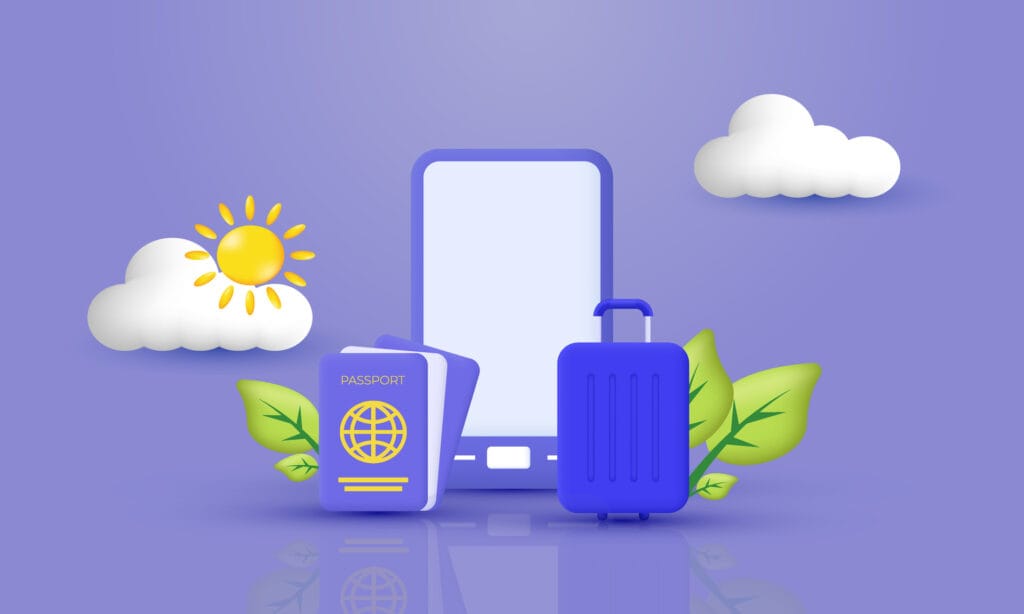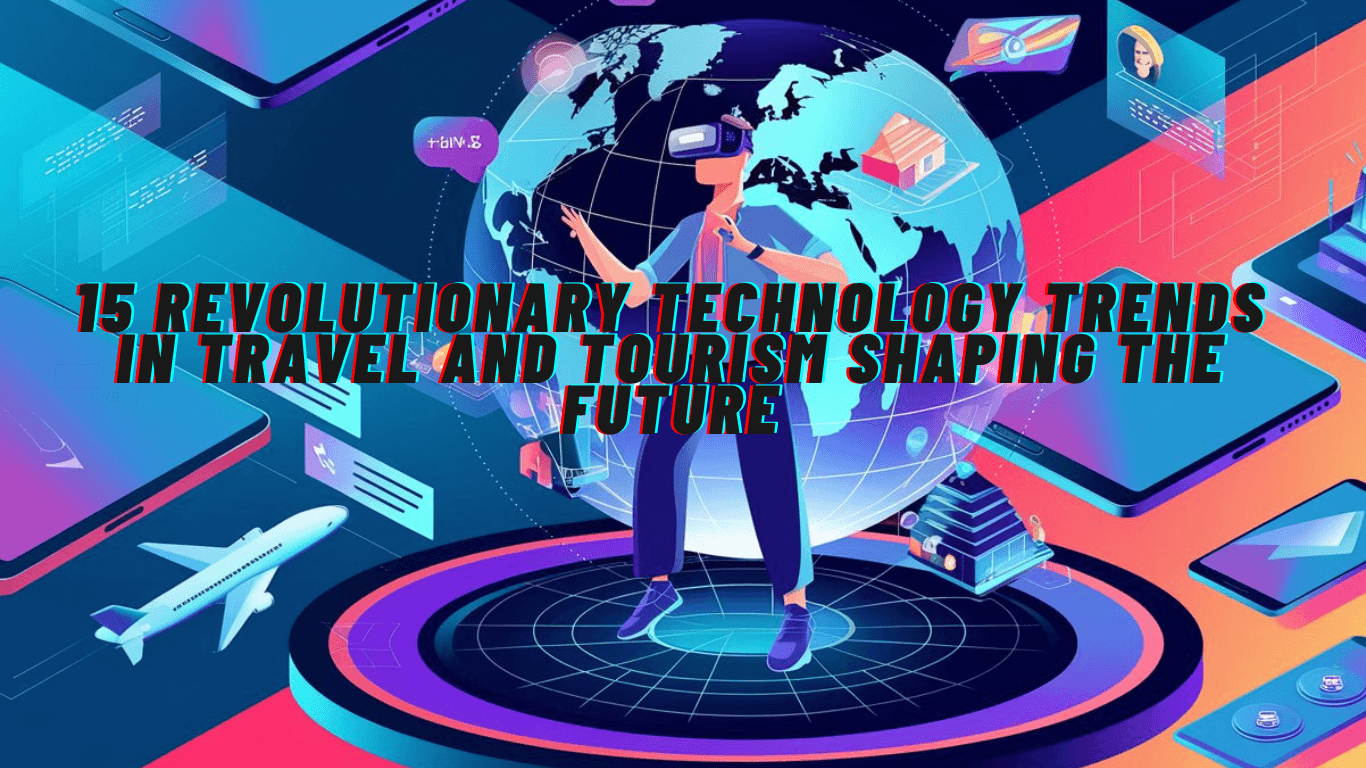The industry of travel and tourism has always been a significant source by which the world’s connections and development were propelled forward. over the past few years, technology has changed the methods of how the world is explored to make it smooth, unique, as well as tailored. Starting from the use of artificial intelligence in operating businesses down to the use of virtual reality in marketing tourism destinations, technology is gradually revolutionizing the system.
While the need for better, faster, and environmentally friendly solutions that would improve the travel industry is becoming a priority, companies and consumers alike use efficient technologies. This article delivers information about 15 Revolutionary Technology Trends in Travel and Tourism Shaping the Future and fully describes them as to their effects and advantages/disadvantages.
More than just enablers, technologies including blockchain, IoT, and AI are enablers of change. They redesign the traveler experience, although at the same time improving the operational functionality in the back-end of the industry. With these concerns, these technologies keep the travel and tourism industry on its toes and up to date with some of the rising issues in the world such as security of data, sustainability, and efficiency.
Overview of Technology Trends in Travel and Tourism
Advanced technologies are not only limited to simply selling traveling services and reading reviews from other customers online. These innovative technologies including artificial intelligence, the internet of things, blockchain, and virtual reality are making highly personalized solutions, fast capable, and relevant solutions, and also effectively solving global issues such as sustainability. This chapter introduces the reader to how these technologies are impacting the travel and tourism sector in preparation for further discussion.
Key Trends Redefining Travel
Artificial Intelligence (AI): The application of the A.I Institute in customer support, customer personalization, and general business productivity.
Virtual Reality (VR): Delivering real-time travel experiences before clients’ actual adventure.
Blockchain: Improving the safety of secure transactions and increasing financial transparency.
Internet of Things (IoT): The role and the construction of complex ecosystems in the selected environments: hotels and airports.
These are not individual disruptive solutions but rather, organic weaves of systems that define the future of travel. Today’s travelers want convenience thus the adoption of these technology solutions and safety, and sustainability issues compel businesses to take up these measures quickly. Moreover, the concept of going mobile and utilizing data analytics has become established as the key to tailored customer needs.
15 Key Technology Trends Revolutionizing Travel and Tourism
1. Smart Chatbots and Virtual Personal Assistants

- Impact: AI-driven chatbots and Virtual Personal Assistants improve customer relations, simplify bookings, and respond to queries instantly.
- Case Study: Skyscanner and Kayak use AI chatbots to help users find flights, hotels, and car rentals.
- Fact: Machine learning algorithms reveal that 87% of customer inquiries in the travel sector can be handled by chatbots.
2. Holography, Virtual Reality (VR), and Augmented Reality (AR)
- Impact: VR allows customers to preview travel destinations before booking, and AR enhances travel experiences by providing real-time information.
- Case Study: Thomas Cook uses virtual reality in stores to offer virtual tours of tourist destinations.
- Fact: Marketing campaigns in virtual reality can boost booking rates by 30%.
3. Internet of Things (IoT)
- Impact: IoT connects devices across airports, hotels, and other travel spaces for smarter operations and real-time updates.
- Case Study: Marriott Hotel uses IoT for managing room temperatures, lighting, and entertainment via smartphones.
- Fact: IoT can reduce energy consumption by up to 20% in the hospitality sector.
4. Blockchain in Secure and Efficient Payment and Data Processing
- Impact: Blockchain technology ensures privacy and efficiency in transactions by eliminating middlemen.
- Case Study: The Winding Tree uses blockchain to reduce transaction costs between travelers and service providers.
- Fact: Blockchain can reduce fraud and operational costs, potentially saving $4 billion in the travel industry.
5. Biometric Authentication
- Impact: Biometric systems enhance travel safety through self-service kiosks for check-in and check-out.
- Case Study: Heathrow Airport uses biometric technology to streamline passenger traffic.
- Fact: 77% of airports plan to implement biometric systems by 2025.
6. Contactless Transactions
- Impact: Contactless payments enable quick and secure transactions without physical contact.
- Case Study: Contactless payment systems at airports and on public transport, such as the London Underground, enhance convenience.
- Fact: 60% of travelers prefer contactless payment methods post-pandemic.
7. Sustainable Travel Technology

- Impact: Sustainable travel products and services aim to reduce the environmental impact of travel.
- Case Study: Air New Zealand is testing sustainable aviation fuel (SAF) to lower emissions.
- Fact: Integrating sustainability into travel technology could reduce global CO2 emissions by 10%.
8. Big Data Analytics for Personalization
- Impact: Big data enables personalized offers and optimized operations based on traveler behavior.
- Case Study: Delta Airlines uses data to predict delays and improve customer service.
- Fact: Big data analytics could contribute $820 billion to the travel industry by 2026.
9. Mobile Apps for Travel Management
- Impact: Mobile apps allow travelers to manage bookings, receive notifications, and track trips in real-time.
- Case Study: TripIt and Google Trips help travelers organize itineraries and track flights.
- Fact: 85% of travelers use mobile devices for bookings and planning.
10. Cloud-Based Travel Platforms
- Impact: Cloud technology supports scalable solutions for travel agencies, reservations, and customer management.
- Case Study: Amadeus’ cloud platform enables seamless flight booking and reservation management globally.
- Fact: Cloud adoption reduces operational costs by 25% for travel businesses.
11. Voice Search and Smart Assistants
- Impact: Voice-activated technology enables travelers to search and book services with ease.
- Case Study: Expedia collaborates with Amazon Alexa, allowing customers to book flights and hotels via voice commands.
- Fact: By 2025, 50% of all travel searches will be conducted through voice search.
12. Wearables for Travel Notifications
- Impact: Wearables offer real-time alerts, health monitoring, and navigation assistance to travelers.
- Case Study: Disney’s MagicBands help guests navigate parks, make payments, and access personalized experiences.
- Fact: The wearable travel tech market is projected to reach $7.8 billion by 2028.
13. Robotics for Hospitality
- Impact: Robots improve operational efficiency and customer experience through tasks like check-ins, room service, and cleaning.
- Case Study: Japan’s Henn-na Hotel employs robot concierges to assist guests.
- Fact: Using robots in hospitality can boost operational efficiency by 30%.
14. Geolocation and GPS Technology
- Impact: Geolocation powers navigation, location-based services, and real-time tracking for travelers.
- Case Study: Uber and Lyft utilize GPS for location-based ride-hailing services.
- Fact: Geolocation services increase traveler satisfaction by 70%.
15. Advanced Cybersecurity Solutions
Fact: Travel-related cybersecurity prevents $1.5 billion in fraud annually.
Impact: Enhanced cybersecurity protects traveler data from fraud and digital threats.
Case Study: Travelport employs advanced encryption technologies to secure booking information.
Challenges in Adopting Technology in the Travel Industry
Adopting these advanced technologies comes with challenges like high costs, skill gaps, and resistance to change. Businesses must balance investment in innovation with practicality, ensuring accessibility for all stakeholders.
Key Challenges
- High Costs: Developing and integrating new technologies require substantial investment, particularly for small and medium-sized enterprises (SMEs).
- Skill Gaps: Employees often lack the technical expertise needed to implement and operate new systems effectively.
- Data Security Concerns: With increased digitization comes the risk of data breaches, which can erode customer trust.
- Resistance to Change: Traditional businesses may hesitate to adopt unfamiliar technologies.
Practical Solutions
- Partnerships: Collaborating with tech providers can lower costs.
- Training Programs: Upskilling employees ensures smoother transitions.
- Government Support: Subsidies and grants can help smaller businesses adopt technologies.
Example: A small boutique hotel partnered with a tech startup to integrate IoT solutions for smart room controls, enhancing guest satisfaction while minimizing energy costs.
Expert Insights on Future Technology Trends in Travel and Tourism
Experts predict that technologies like AI and blockchain will dominate the travel industry in the next decade. They emphasize the need for sustainability and inclusivity in tech adoption.
Predictions from Industry Leaders
- AI for Personalization: “AI will soon predict not just what a traveler wants but when they want it, enhancing real-time personalization,” says Jane Doe, CTO of TravelTech Solutions.
- Blockchain in Payments: John Smith, a blockchain expert, believes that decentralized payment systems will eliminate transaction fees, benefiting travelers and businesses alike.
- Sustainability: Dr. Emily Green highlights that sustainable travel technologies, like biofuels and eco-friendly IoT devices, will become industry standards.
Emerging Trends to Watch
- Hyper-Personalized Experiences: Leveraging big data for tailor-made itineraries.
- Smart Cities: Integrating travel systems with urban infrastructures for seamless experiences.
- AI-Powered Insights: Using AI to predict and address travel trends.
Conclusion: Embracing the Future of Technology in Travel and Tourism
The integration of these 15 technology trends is reshaping the travel and tourism industry, offering smarter, safer, and more personalized experiences. By staying ahead of these trends, businesses can thrive in a competitive landscape, while travelers enjoy unparalleled convenience and innovation.
Technology is no longer an option but a necessity for growth and sustainability in this dynamic industry. As we look to the future, embracing these advancements will ensure a prosperous and transformative journey for all stakeholders. Let’s continue to explore, innovate, and redefine the world of travel and tourism.
Frequently Asked Questions (FAQs) on Technology Trends in Travel and Tourism
- How is AI changing the travel industry? AI is revolutionizing customer support, automating processes, and providing personalized recommendations, making travel planning seamless.
- What is the role of VR in tourism marketing? VR allows travelers to explore destinations virtually, enhancing decision-making and increasing bookings.
- Are blockchain technologies widely adopted in travel? While adoption is growing, blockchain remains underutilized. However, its potential to enhance transparency and reduce costs is promising.
- How can small businesses benefit from tech trends? Small businesses can adopt affordable solutions like mobile apps and cloud computing to streamline operations and improve customer experiences.
- What challenges do companies face when implementing IoT in travel? Challenges include high initial costs, integration complexities, and data security concerns.
- What are the latest technology trends in travel and tourism? Some of the latest trends include the use of Artificial Intelligence (AI), Internet of Things (IoT), blockchain, augmented reality (AR), virtual reality (VR), and mobile applications for personalized services, efficient bookings, and seamless travel experiences.
- How is artificial intelligence transforming the travel industry?AI is revolutionizing the travel industry by enabling personalized recommendations, chatbots for customer service, predictive analytics for pricing, and automating routine tasks such as booking, check-in, and customer support.
- What are the benefits of using augmented reality in tourism? Augmented reality enhances the tourism experience by providing interactive maps, historical site overlays, language translation, and immersive experiences at tourist destinations, making travel more engaging and informative.
- How does blockchain improve travel and tourism services? Blockchain ensures secure, transparent, and faster transactions in the travel industry. It helps reduce fraud, streamline bookings, and simplify payment processes, as well as ensure transparency in supply chain management.
- What are some examples of IoT applications in the travel industry? IoT applications include smart luggage that can be tracked in real-time, smart hotel rooms with automated features (lighting, temperature, etc.), and sensors that monitor baggage handling or aircraft conditions for safety and efficiency.
- How can smart tourism technologies enhance the traveler experience? Smart tourism technologies enhance the traveler experience by offering personalized itineraries, real-time travel updates, contactless payments, and customized services, all through smartphones and smart devices.
- What role does technology play in sustainable tourism? Technology plays a significant role in promoting sustainable tourism by reducing energy consumption, supporting eco-friendly transportation options, enabling waste management solutions, and offering travelers information on green destinations and practices.
- How is digital transformation affecting the travel industry? Digital transformation is revolutionizing the travel industry by providing innovative solutions like mobile check-ins, digital boarding passes, contactless services, and virtual tours, making the travel experience more efficient and enjoyable.
- What are the emerging technologies shaping the future of tourism? Emerging technologies like AI, AR/VR, blockchain, 5G connectivity, and smart tourism are shaping the future of tourism, offering enhanced customer experiences, streamlined operations, and more sustainable travel options.
- How do technology trends impact global tourism growth? Technology trends contribute to global tourism growth by improving operational efficiencies, lowering costs, attracting new customers through digital marketing, enhancing customer experiences, and supporting sustainable practices, leading to increased accessibility and demand for travel.
